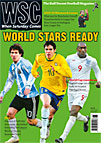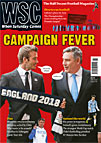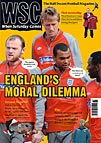 It’s the 40th anniversary of a season that began with a dramatic garden party, a tape recorder and a set of match-fixing allegations that shocked West German football, writes Gunther Simmermacher
It’s the 40th anniversary of a season that began with a dramatic garden party, a tape recorder and a set of match-fixing allegations that shocked West German football, writes Gunther Simmermacher
A pall of gloom hung over the Bundesliga as a new season started 40 years ago. The clouds had started to gather just over two months earlier, at a garden party to celebrate the 50th birthday of a fruit importer. June 6, 1971 was a sunny day. Horst-Gregorio Canellas, the gravelly-voiced Kickers Offenbach president, welcomed the luminaries of the German FA (DFB) and influential journalists to his home in the Rosenstrasse in the village of Hausen. At exactly ten minutes past noon, a sound engineer clicked the play button of a centrally-placed tape recorder, Canellas sat back as he theatrically flourished a cigarette, and West Germany’s biggest football scandal broke.
Film footage shows a perplexed national coach Helmut Schön hearing Bernd Patzke of Hertha Berlin – who had played in the World Cup semi-final against Italy a year earlier – and another Hertha player, Tasso Wild, proposing to fix games to manipulate the relegation battle that had concluded only a day earlier, followed by Schön’s number three keeper, Manfred Manglitz of FC Cologne, offering to throw his club’s game against Kickers.
That final round of the 1970-71 season had ended with Offenbach’s relegation after a 4-2 defeat in Cologne – Manglitz didn’t play after Canellas alerted FC captain Wolfgang Overath to the goalkeeper’s corruption. Rot-Weiss Oberhausen had saved themselves on goal difference with a suspect draw at Braunschweig, and Arminia Bielefeld survived with a 1-0 win in Berlin – as the crowd’s perceptive chants of “fix, fix” echoed through the Olympiastadion.
Much as the revelations on Canellas’ tapes shocked the public, the clues had been there before. Schalke’s home defeat against Bielefeld in April had been regarded as highly suspicious (as if to make up for it, Schalke went on to lose also against Offenbach and Oberhausen). Canellas first became aware of match-fixing in early May when he received a telephone call from Manglitz, who asked for an incentive fee to not accidentally “let in a few” against Offenbach’s relegation rivals Rot-Weiss Essen, who would finish bottom of the table. Canellas paid, and Cologne won. He could do nothing about Cologne’s 4-2 home defeat to Oberhausen three weeks later – that game was fixed.
Astonishingly, some players claimed to be unaware that they were breaching ethics. Braunschweig’s international Max Lorenz even wanted to issue receipts for the bribes he received, as if these were legitimate business transaction. His teammate Franz Merckhoffer later recalled in a TV interview: “I didn’t think much of it. If the senior players were taking the money, I thought I was entitled to do so myself”.
Canellas hoped that the incontrovertible evidence would move the DFB, whose secretary-general was present at his birthday party, to relegate Bielefeld, thereby saving his club. Instead, the federation swiftly banned Manglitz, Patzke, Wild – and Canellas, on the grounds that he had admitted to having made bribery payments. Offenbach went down; Bielefeld and Oberhausen were allowed to kick off the new season in the top flight. Feeling betrayed, the whistleblower turned sleuth, uncovering an impressive quantity of dirt. He had even warned the DFB of corruption, in early May, when he reported Manglitz’s approach in regard to the Essen game, the one he paid for and for which he would be punished. The DFB had dismissed his allegations as “vague suspicions”.
When Canellas uncovered evidence of Schalke’s fixed defeat against Bielefeld, eight Schalke players sued for libel. These players, who included the great Reinhard Libuda and future West Germany internationals Klaus Fischer and Rolf Rüssmann, eventually were found guilty of perjury and fined, earning their club the moniker FC Perjury. That game would become emblemic of the scandal.
Their hand forced, the DFB initiated a thorough investigation, headed by its relentless chief prosecutor, the judge Hans Kindermann. More than 50 players from seven clubs, two coaches and six club officials were punished. Altogether 18 games were officially declared fixed (remarkably, none of the results was annulled).
As a result of the scandal, attendance records dropped sharply over the next couple of seasons, from a match average of 20,661 in 1970-71 to 17,932 the following season and a record low of 16,387 in 1972-73 – at a time when all members of the West German sides that went on to win the European Championship in 1972 and the World Cup two years played in the Bundesliga.
Indeed the 1971-72 season was something of a high-water mark for the quality of football. Bayern Munich and Schalke (strengthened by the arrival of the Kremers twins from relegated Offenbach) played brilliantly in their neck-to-neck race for the championship which culminated in a title-decider on the last day of the season, held as late as June 28. In the inaugural game at the new Olympic Stadium, Bayern won and became the only side ever to score more than 100 goals in a Bundesliga season.
The following year, Schalke’s young squad fell apart as several of their scandal-tainted players were banned or left West-Germany. A purple patch in 1976-77 apart, the club never recovered. Bielefeld might have started the 1971-72 season like everybody else with 0 points – but that’s the points total with which the club finished. In mid-April, the DFB finally pronounced its punishment: Arminia would be relegated with 0 points, with all their results counting only for or against their opponents. Bielefeld was allowed to play out their final six games, winning only one of those, a 3-2 before 9,000 spectators that helped send Dortmund down with them. With 19 points, Bielefeld would have been relegated anyway. Taking their place in the following season was Kickers Offenbach. Rot-Weiss Oberhausen was not punished and survived for another year.
The DFB was proactive in fixing the root causes of the scandal: the federation abolished the maximum wage system, and it set up a second professional tier, starting in 1974, to cushion the harsh consequences of relegation on players.
And soon the spectators returned in even greater numbers than before. West Germany’s success in hosting and eventually winning the 1974 World Cup reignited a passion for football in the country. The clouds of the scandal were lifted.
From WSC 295 September 2011


